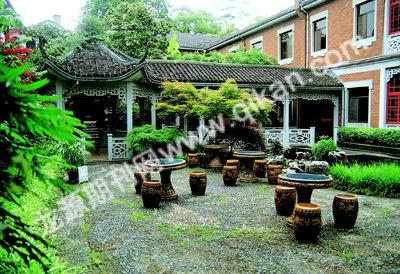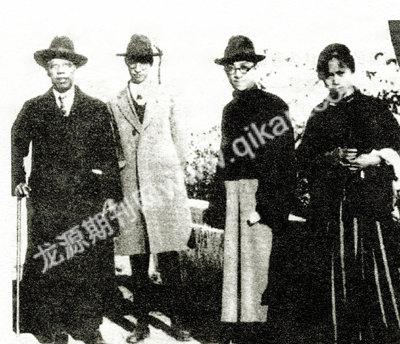Lakeside Hotel Indicates History,Culture
Qi Yongye

Xin Xin Hotel in Chinese or The New Hotel as its first owner called it in English is a landmark of the West Lake for about 100 years.
The year 1911 marked the downfall of the Qing Dynasty (1644-1911) and the birth of the Republic (1911-1949), bringing modernization changes to Hangzhou. From July 1912 on, the city wall that had separated the downtown and the West Lake began going down. The lake and the city became one, opening a new chapter to the urban development of Hangzhou. The removal of the city wall brought developers to the North Hill Road, which stretches from east to west between the lake and the hills that hug the lake on the northern side. These developers, however, found that someone had already built a magnificent compound on the lake long before their arrival.
The three-house compound was named He Zhuang (The He Familys Residence), built by He Baoling, a Shanghai-based business baron that operated the countrys earliest chain stores in the late Qing Dynasty. A native of Ningbo, Zhejiang, the successful businessman yearned for a peaceful life. So he came to the capital of his home province and built the residence on the lake outside the city proper. His son He Jifan was not as passionate as his father about a peaceful life on a lake. After the demise of his father, He Jifan turned the compound into a hotel in 1913 after a refurbishment project as he was fully aware of the commercial value of the lakeside location.
It was not an old-fashioned hotel. It offered new and fashionable things, reflecting the emerging westernization trend in the country. He Jifan turned the management of the hotel to Dong Xigeng, presumably Chinas earliest professional hotel manager. Another important duty Dong Xigeng did was to take care of He Jifans mother who was living her evening years at the hotel.
Under the care of Dong, the hotel business prospered and its reputation spread. In 1922, the hotel started an expansion project. A five-story house in Corinthian style came up beside the original compound. The floor area of the new estate was 2,685.9 square meters and the new wing of the hotel had 92 rooms and a full range of facilities such as a restaurant, a library, a billiard room, a ball room, and an outdoor movie court. The hotel also provided services such as boats, cars, and sedan chairs. It became one of the most luxurious hotels in the country.

He Jifan later turned the ownership of the hotel to Dong Xigeng. Historians have never found out exactly why. They assume it was presumably because he did not have time for the hotel management in Hangzhou, or because he felt he owed the success of the hotel to Dong or because he was grateful to Dong for his taking great care of Hes mother.
Another person closely associated with Xin Xin hotel is Zhang Jingjiang (1877-1950), one of the four wealthiest men in Zhejiang in the early years of the Republic and a veteran politician who helped the founding of the Republic and took important positions in the government of the Republic. After Xin Xin hotel was expanded, a project to rebuild the North Hill Boulevard was started. According to the blueprint, the hotels lobby would have to be dismantled because the curved part where the hotel stood would be straightened. After Dong had a talk with provincial governor Zhang Jingjiang, Zhang instructed to keep the lakeside curve where the hotel stood.
In 1929, the first West Lake Exposition was held in Hangzhou. The expo was a whopping success. The four-month expo at a cost of 1.2 million yuan attracted more than 20 million visitors viewing 147,600 exhibits. Zhang Jingjiang, who was the man behind the success of the expo, stayed at the hotel during the expo to coordinate the biggest affair the city had ever seen and receive important guests from all over the country. Scholars of today agree that Xin Xin hotel was the very witness to the glory and success of the first West Lake Exposition.
The hotel today includes a previously separate neighboring residence built by Shi Liangcai in 1925 for his wife Shen Qiushui. The residence was named Qiushui House, after Shis wife. Shi Liangcai (1880-1934) was a heavyweight businessman and a newspaper tycoon in Shanghai. He was assassinated by his political enemies in 1934. After 1949, the residence was taken by the government and became a part of Xin Xin hotel. In 1990, the residence resumed the name of Qiushui Residence but remains part of the hotel.
The romance of Shi Liangcai and Shen Qiushui is not the only one the hotel has witnessed over its long history. For example, Gertrude Du-Wagner and Du Chengrong, an Austrian woman and a Chinese policeman, celebrated their wedding at the hotel on February 24, 1935. Sixty years after her stay in her husband home village in Dongyang in central Zhejiang Province, Gertrude Du-Wagner revisited the hotel in 1995, accompanied by her children.
The VIP list in the history of the hotel is long and impressive. Cultural celebrities such as Hu Shi, Xu Zhimo, Li Shutong, Ai Qing, Ba Jin, Huang Shang, and Xiao Jun once stayed at the hotel.
In May, 2007, Dong Yanshan, the son of Dong Xigeng, visited Xin Xin hotel. He received warm-hearted welcome at the hotel. At the reception, he reminisced his childhood years at the lakeside hotel.
Today, Xin Xin hotel is part of the historical and cultural zone of North Hill Boulevard. It went through a refurbishment project in 2004, which restored its historical appearance. On March 16, 2005, the two buildings of the hotel were listed as cultural heritages under the provincial protection. □

